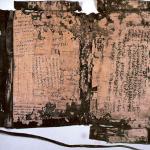I thought I should write a blog post comparing lost Gospels to lost Doctor Who episodes after reading the recent post by Philip Jenkins on The Anxious Bench. Both involve things that are known to have existed yet of which we do not have extant copies. We sometimes have snippets of them. (We do have the full audio of the lost Doctor Who episodes, which makes our knowledge of them far superior to our knowledge of works like the Gospel according to the Hebrews). They occasionally turn up in places which had copies buried in their archives which no one bothered either to pull out or get rid of. Trying to actively seek them out only rarely bears fruit. There are too many possibilities and no way of knowing in advance where it is worth looking.
The way that Bede refers to the Gospel according to the Hebrews and emphasizes what it’s status ought to be suggests that he possessed a copy, perhaps of Jerome’s Latin translation. Is there even a slight chance there might be a copy of it tucked away in Durham? Perhaps as the underlying erased text in a palimpsest, if nothing else? If not Durham, perhaps elsewhere in the UK? I have been to the library at Durham Cathedral many times. They have been digitizing their holdings – take a look at the Durham Priory digitized book collection. I will be spending time there in June 2023. It seems impossible to imagine that something like that remains. But if it doesn’t exist any longer as such, might it be there in the form of a palimpsest, a reused manuscript whose earlier contents can be discerned through the use of high tech spectral imaging equipment?
Also related, Jim Davila mentioned Jenkins’ post and also linked to an earlier one of his own on this topic.
Peter Gainsford’s post about whether we can trust medieval manuscripts of more ancient texts also seems relevant, since I’ve been talking about later copies of works from centuries earlier. Tommy Wasserman and Jim Davila both offered thoughts in response to Gainsford’s post. All of history involves both trust and suspicion. If our only requirement in order to dismiss something as of no historical value is the possibility of doubt, then we can know nothing or almost nothing about the distant past. If all it takes for us to give our credence is mere possibility, we will believe much that is untrue. It is the lack of a balance between these two that leads me to criticize both religious and anti-religious rejection of a balanced historical approach. (I’ll be presenting at AAR on Late Antique sources and their historical value in relation to people and events in earlier times, so expect more thoughts on this topic here on the blog soon.)
See as well:
I’m eager to take a look at the new book Brepols has out, The Discoveries of Manuscripts from Late Antiquity.
See too Tony Keen’s series on Doctor Who and history, and news about what the show might do to mark its 60th anniversary.
Bart Ehrman’s post on why the canon of the New Testament matters is also relevant.
Finally, here again is a link to Philip Jenkins’ post mentioned above, in case you did not click through to read it then.













